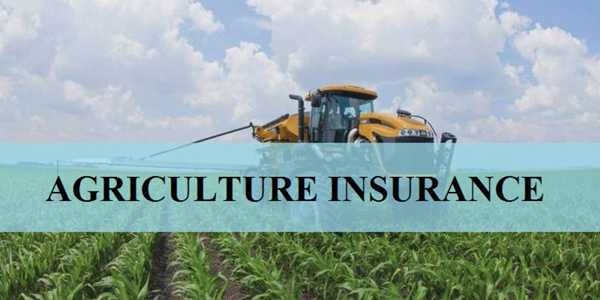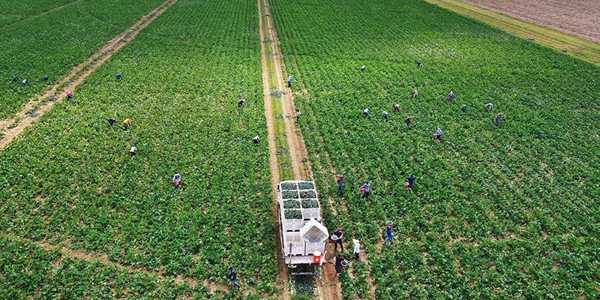
Why Agricultural Insurance Is Vital For Farmers
Agriculture is a cornerstone of many economies, especially in developing countries where farming provides food security and livelihoods. However, agriculture is one of the most unpredictable industries due to its exposure to risks such as bad weather, pests, diseases, and fluctuating market prices. For farmers, these risks are inconvenient and can be devastating. That's where agricultural insurance comes in. This article will explore why agricultural insurance is essential for farmers and how it can support stability, growth, and resilience in farming communities.
Agriculture is a cornerstone of many economies, especially in developing countries where farming provides food security and livelihoods. However, agriculture is one of the most unpredictable industries due to its exposure to risks such as bad weather, pests, diseases, and fluctuating market prices. For farmers, these risks are inconvenient and can be devastating. That's where agricultural insurance comes in. This article will explore why agricultural insurance is essential for farmers and how it can support stability, growth, and resilience in farming communities.

Mitigating Financial Losses
Farmers invest heavily in their crops, livestock, and equipment. A lousy season—whether due to drought, floods, or disease outbreaks—can lead to a total or partial loss of income. Farmers often face financial ruin without insurance and are left with few options. They may need to take out high-interest loans, sell assets, or abandon farming altogether.
Agricultural insurance provides a safety net by compensating farmers for losses. This allows them to recover more quickly, continue farming, and avoid falling into debt traps. By covering losses due to events beyond their control, insurance reduces the financial stress that comes with unpredictable farming conditions.
Stabilizing Income
Farming is inherently seasonal, and income can be irregular. When crops fail, or livestock dies, the income loss can be severe, making it difficult for farmers to cover day-to-day expenses, reinvest in their farms, or even feed their families. Agricultural insurance helps stabilize income by providing payouts when things go wrong. This financial stability enables farmers to plan better, invest in improvements, and make long-term decisions without worrying about potential setbacks.
Stable income is also crucial for smallholder farmers who operate on tight margins. A single bad season can push these farmers into poverty. Insurance acts as a buffer, ensuring that even in a bad year, they have enough income to sustain themselves and their families.
Encouraging Investment And Innovation
Agricultural insurance encourages farmers to take calculated risks. Farmers are more likely to adopt new technologies, diversify crops, or expand their operations, knowing their investment is protected. This is especially important in developing regions where farmers might otherwise be reluctant to invest in costly improvements due to the fear of losing everything in a bad season.
When farmers have the confidence to invest, it leads to greater productivity and efficiency. They can try higher-yield crops, upgrade equipment, or implement better farming practices. This can boost overall agricultural output and contribute to food security.
Promoting Resilience To Climate Change
Climate change has a growing impact on agriculture, with more frequent and severe weather events, changing rainfall patterns, and increased pest pressure. Adapting to these changes is critical but challenging for farmers without adequate resources. Agricultural insurance helps build resilience by providing financial protection against extreme weather and climate-related losses.
Insurance schemes can also be designed to incentivize climate-smart practices. For example, some insurance providers offer premium discounts to farmers who adopt sustainable methods like conservation tillage or water-efficient irrigation. This protects farmers from immediate risks and encourages long-term resilience to climate change.
Reducing Reliance On Government Aid
When disaster strikes, governments provide aid packages to support affected farmers in many countries. While this is crucial in emergencies, relying solely on government assistance is not sustainable in the long run. Agricultural insurance reduces the need for large-scale government bailouts by enabling farmers to manage their risks independently.

Insurance spreads risk across a larger pool of policyholders, making it more efficient than ad-hoc government aid. This frees up public resources for other developmental priorities while ensuring that farmers receive timely and adequate compensation when needed.
Supporting Rural Economies
Agriculture is often the backbone of rural economies. When farmers suffer, the effects ripple through the entire community. Local businesses like equipment suppliers, seed stores, and transport services depend on healthy, productive farms. Agricultural insurance helps stabilize these local economies by ensuring farmers can continue operating after a disaster.
Moreover, insured farmers are less likely to abandon their farms or migrate to cities for work. This keeps rural communities intact and helps maintain a stable agricultural workforce. In regions where farming is a primary livelihood, this stability is essential for overall economic development.
Boosting Credit Access
Access to credit is a significant challenge for many farmers, especially smallholders. Banks and financial institutions are often hesitant to lend to farmers because of the inherent risks involved in agriculture. Agricultural insurance makes farmers more creditworthy by reducing the risk for lenders. When a farmer is insured, lenders know that even in the event of a disaster, the farmer will receive compensation, making it more likely that they can repay their loans.
With improved access to credit, farmers can invest in better seeds, fertilizers, machinery, and other inputs that increase productivity. This, in turn, leads to better harvests and higher income, creating a positive cycle of growth and development in the farming sector.
Enhancing Food Security
Food security is closely linked to stable and productive agriculture. When farmers face losses due to natural disasters or other risks, it directly impacts food supply chains, leading to shortages and higher prices. Agricultural insurance helps maintain consistent food production by enabling farmers to recover quickly from setbacks and continue producing.
This is particularly important in regions where food insecurity is a constant concern. Insurance protects farmers from catastrophic losses and ensures communities can access affordable and sufficient food.
Conclusion
Agricultural insurance is not just an optional extra for farmers—it's a vital tool for safeguarding their livelihoods, stabilizing incomes, and promoting growth and resilience in rural communities. With climate change, market volatility, and other risks making farming increasingly unpredictable, the need for agricultural insurance is more significant than ever. By mitigating losses, encouraging investment, and supporting rural economies, insurance helps ensure that farmers can continue feeding their communities and supporting their families, even in the face of adversity.





